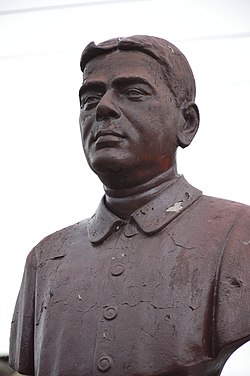Birendranath Sasmal
This article includes a list of general references, but it remains largely unverified because it lacks sufficient corresponding inline citations. (December 2013) |
Birendranath Sasmal (26 October 1881 - 24 November 1934) was a lawyer and political leader. He was known as Deshpran because of his work for the country and for his efforts in the Swadeshi movement.
Birendranath Sasmal | |
|---|---|
 Deshparan Birendranath Sasmal bust at Contai | |
| Born | 26 October 1881 Chandiveti Contai, Midnapore District, India |
| Died | 24 November 1934 Kolkata, India |
| Other names | Biren Sasmal |
| Movement | Indian Independence movement |
Early lifeEdit
Birendranath Sasmal was born in Contai, in undivided Midnapore district. His father was the Zamindar Biswambhar Sasmal and mother's Anandamoyee. He passed the Entrance Examination in 1900 and got admission into Ripon College of Calcutta for higher education. After finishing his college he went to England to study law. He returned to India after becoming a barrister.
Revolutionary activitiesEdit
For political reasons, Midnapore district was proposed to divided into two by British Raj and Biren Sasmal started protesting against it. He toured the region and organised protest movements. The proposal for partition was withdrawn. He started practising law at Calcutta High Court in 1904. In 1913 leaving Calcutta High Court, Birendranath practiced in Midnapore District Court for a few years but later he again joined the High Court. In the High Court, he defended the accused in the Chittagong Armed Robbery case. He was jailed for nine-month by British Raj for calling a general strike during the visit of King George V to British India. During his stay at Presidency Jail he wrote his autobiography named Sroter Trina.
Non-Cooperation Movement (1920)Edit
In Nagpur Congress in 1920, non-cooperation programme was passed. Chittaranjan Das was the President of Bengal Congress and Birendranath was its Secretary.
No-Tax Movement (1920–1922 )Edit
Bengal Village Self Government Act was passed in 1919. According to that law, 227 Union Boards were formed in the district. Birendranath took up the cause of his people, and plunged into Boycott Movement. He declared that he would walk on bare feet until the Union Boards were not done away with.[1] On 17 December 1921, 226 Union Boards were abolished and the last one was abolished the next year. In a gathering, with loud cheers, people put shoes on the feet of their leader.
Labon Satyagraha (1930)Edit
Birendranath's was also involved in the movement. His followers took active part in organizing people. Satyagrahis came to Narghat and Pichhhaboni to break Salt Law by peaceful means. The Satyagraha assumed the form of a mass movement in the area.
Election to Calcutta Corporation, Central Legislative Assembly, and death (1933-1934)Edit
In 1933, Birendranath was elected to Calcutta Corporation. At the request of Pandit Madan Mohan Malavia, he contested in Central Legislative Assembly election from a two–district seat of Burdwan division and won it but he had died of a heart attack, aged 53, before the result was announced.
A road in South Kolkata (Deshparan Sasmal Road) is named after him.
ReferencesEdit
External linksEdit
- Roy, Ranjit (2012). "Sasmal, Birendranath". In Islam, Sirajul; Jamal, Ahmed A. (eds.). Banglapedia: National Encyclopedia of Bangladesh (Second ed.). Asiatic Society of Bangladesh.
- Deshparan Birendranath Sasmal